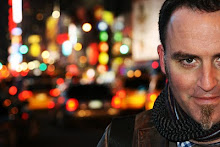The service was wonderful. Nathan sang movingly. I accompanied him on a broken keyboard. Lisa read A Poem for George, her own poem. It was honest and deeply dignified. She spoke of many things that hadn't occurred to me; the pain of taking a pram back to the shop, the things she and Mark had longed to do with their son, how perfect he'd looked as she cradled him in her arms. It finished me off and I wept bitter tears.
The funeral ended with the most beautiful thing. At the back of the church were 100 white, helium-filled balloons, and on every seat, a luggage label had been left for each member of the congregation to write a short message to George. Mine said simply "George, mate, I hope this reaches you in heaven." We tied our messages to ribbons on the balloons and went into the church yard to release them simultaneously.
I shall never ever forget that moment. The Brahms Lullaby was playing on a stereo and the sun was glinting in our eyes as we watched the balloons sailing into the distance, across the dark fields. We stood there for some minutes as the balloons sailed higher and further away. Up and up towards heaven, until they were tiny black freckles in a cornflower blue sky. It was a moment that will live with me until the day I die. I love the thought that someone, miles away in a little Midlands town, might find one of the balloons, read one of our messages, and wonder who little George was, and why he was so loved by so many.
George's balloons
350 years ago, Pepys went with the two Sir Williams to Walthamstow, where they met Lady Batten and her daughters. Sadly, Mademoiselle Batton was in a terrible mood, and wanted the world to know, which Pepys considered to be terribly ungallant and a sign of very bad breeding.
It was nevertheless a very pleasant day and the assembled group sat on a church stile and ate a picnic... until it started raining rather badly and everyone was forced home.
On the way back to London, Pepys and Sir William Penn came across two "country folk" on the back of a single horse. Both groups refused to give way to one another; a stand off which rapidly turned into a 17th Century example of road rage. There was a collision and aggressive words were exchanged before both parties went on their way. Sir William, however, refused to let things go and rode back down the lane, angrily knocking both men off their horse. Charming!


No comments:
Post a Comment
Note: only a member of this blog may post a comment.